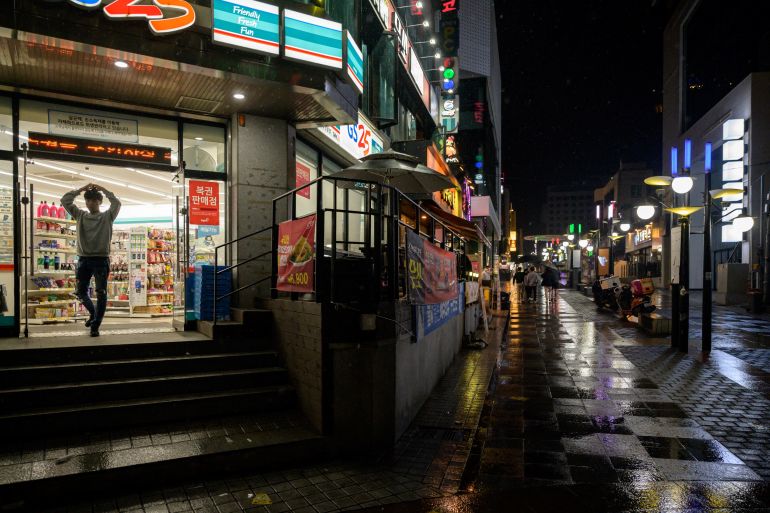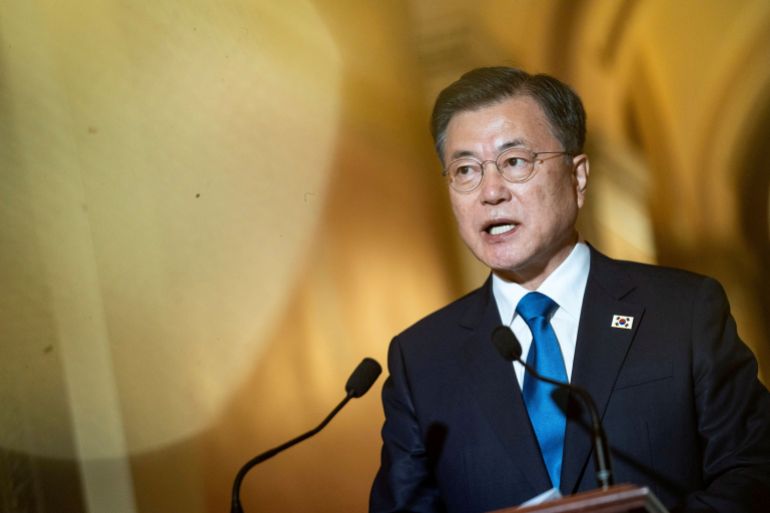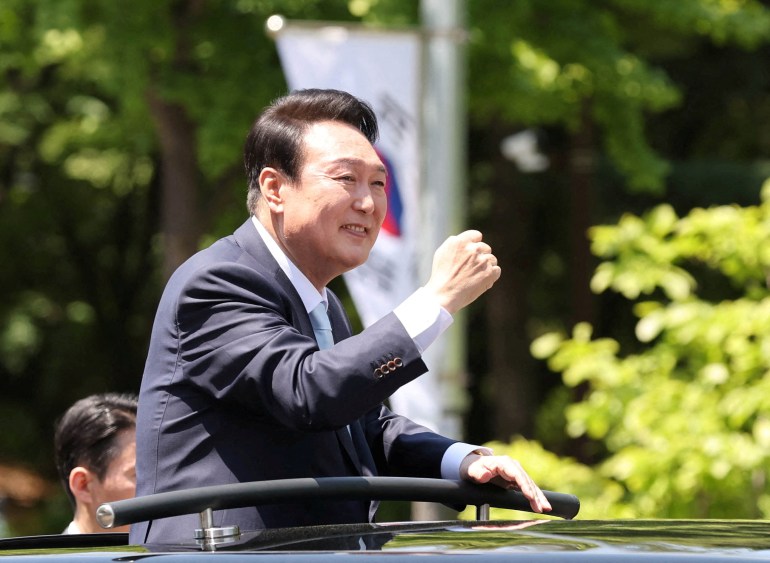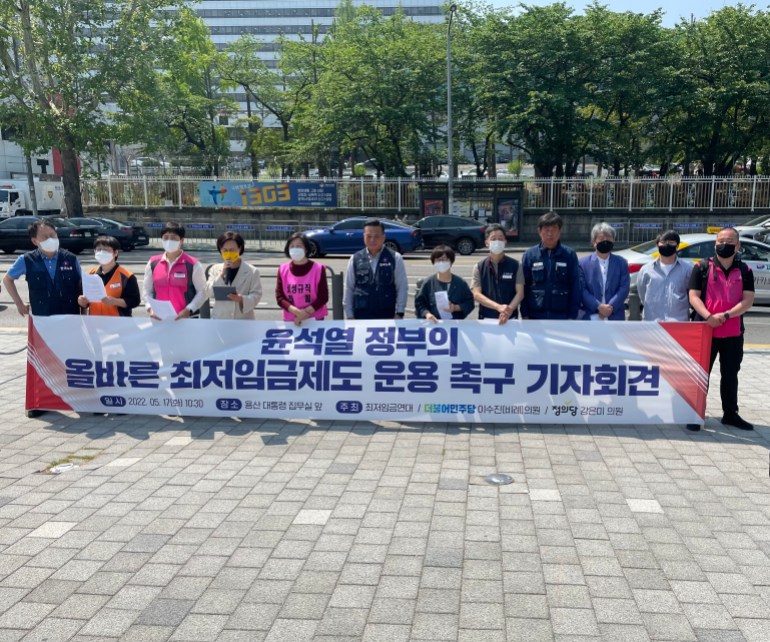South Korea’s low paid brace for ‘pro-market’ turn under Yoon
Yoon Suk-yeol has pledged to enact policies that give companies more room to operate free from excessive regulation.

Seoul, South Korea – Choi Myung-gon works the cashier on the overnight shift at a convenience store in southern Seoul, ringing up purchases and stocking shelves. During the long lulls without customers, he tries to study.
Choi this year plans to sit South Korea’s civil service exam, a highly competitive test that thousands prepare for in the hope of landing stable government jobs. He hopes that a high score will be his ticket out of low-wage work, but often finds it difficult to focus on his books due to his irregular work schedule and long hours working on his feet.
Keep reading
list of 4 itemsBiden says time to ‘stand up to the gun lobby’ after Texas attack
N Korea fires three missiles hours after Biden leaves Asia
New Zealand raises interest rates amid inflation concerns
South Koreans customarily work long hours, and slowing growth and rising costs of living in Asia’s fourth-largest economy have many struggling to get ahead.
While workers like Choi have been given a boost in recent years in the form of large bumps in the minimum wage, many are still finding it difficult to make ends meet.
“Over the past five years, I don’t think the minimum wage increases improved workers’ daily lives very much,” Choi told Al Jazeera. “Of course, it’s better having a higher wage, but with housing being more expensive and food being more expensive, things have just gotten harder.”

Moon Jae-in, the left-leaning previous president, took office in 2017 pledging to ease inequality by boosting the incomes of low-wage workers. Moon, who left office when his term ended in early May, argued that raising the minimum wage would set off a virtuous cycle whereby workers with extra cash would spend more, spurring consumption and creating more jobs.
South Korea’s minimum wage currently stands at 9,160 won ($7.25) per hour. In 2018, Moon’s first full year in office, the minimum wage spiked by 16.4 percent – the largest annual increase ever. The following year’s increase was more than 10 percent, followed by increases in the 1-2 percentage-point range and 5.05 percent last year.
The recent inauguration of Yoon Suk-yeol, a political neophyte who represents the conservative People Power Party, has raised expectations that the large increases of the past five years may not continue.
Yoon’s office has said that he will not take an official position on this year’s minimum wage negotiations or join the discussions, which got under way earlier this month.
While short on specifics, Yoon, a former chief prosecutor who campaigned on restoring a market-driven economy, has pledged to enact policies that give companies more room to operate free from excessive regulation.
Employers’ groups have called the minimum wage increases of recent years excessive, arguing that street-level businesses like convenience stores and restaurants cannot afford to pay workers more. At the same time, workers like Choi say the increases are not enough amid soaring prices. In April, South Korea’s consumer inflation spiked to 4.8 percent, the highest level since 2008.

Representatives of labour and business appear headed for contentious negotiations, as unions are insisting a further rise in the minimum wage is necessary to keep pace with rising costs, while employers argue that many small businesses have yet to recover from the damage caused by COVID-19 and cannot handle any additional burden.
At a meeting of the Minimum Wage Commission earlier this month, Lee Tae-hee, an official at the Korea Federation of SMEs, was quoted by local media as saying that small businesses were already worried about “just being able to pay this month’s salaries”.
The structure of South Korea’s economy, where a small number of corporate conglomerates dominate and much of the population is employed by mum-and-dad operations, makes wage negotiations a pressing matter for many households.
“South Korea has a lot of small businesses that rely on low-wage workers who work for long hours, and the rapid increase of the minimum wage was inevitably a burden on them,” Choi Pae-kun, a professor of economics at Konkuk University in Seoul, told Al Jazeera.
Economists have also pointed out that there are alternative methods, such as tax credits, to boost the fortunes of struggling workers without imposing costs on small business owners, many of whom are barely getting by.
“In order to strengthen the incomes of low-income households, it is necessary to strengthen transfer payments from the government while adjusting the speed of the minimum wage increase,” Choi said.

In what would be an unprecedented development since South Korea instituted a minimum wage in 1988, employers have also argued in favour of differentiating the minimum wage by industry. Under the proposals, instead of a nationwide standard for all workers, certain low-margin businesses, such as restaurants and motels, would be permitted to pay less.
Labour groups and left-leaning politicians have baulked at the proposed change.
At a recent press conference outside the presidential office in Seoul, Kang Eun-mi, a politician with the left-wing Justice Party, called on the government to recognise the minimum wage’s role in protecting the living standards of society’s most vulnerable.
Differentiating by sector would disproportionately harm women, youths and temporary workers, Kang said, imploring participants in this year’s negotiations to keep vulnerable groups in mind.
“We must work to ensure that the purpose of the minimum wage is not harmed.”